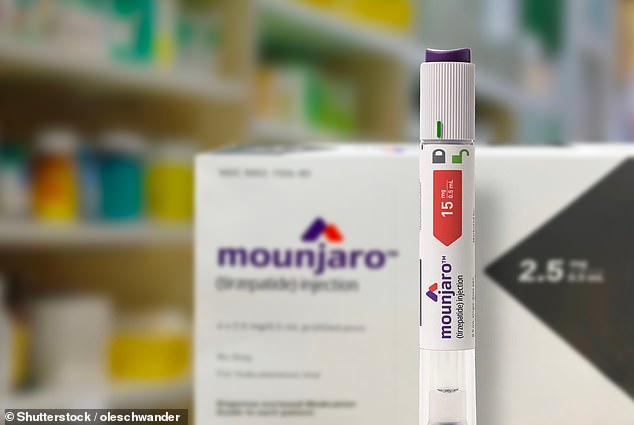Top doctor has revealed how patients can tackle one of Mounjaro’s most mortifying side effects – the ‘sulphur burps’ leaving users with breath that reeks of rotten eggs.
The blockbuster weight-loss jab, also used to treat type 2 diabetes, is part of a new class of drugs transforming obesity treatment worldwide.
Alongside rivals Wegovy and Ozempic, Mounjaro has been dished out to more than 1.5 million Britons – the vast majority through private clinics.
The drugs have been credited with delivering dramatic drops in weight and improved health outcomes for many.
But amid the success stories, users are increasingly reporting an awkward and unpleasant drawback: foul-smelling belches, often likened to the stench of rotten eggs.
The so-called ‘rotten egg burps’ are caused by hydrogen sulphide gas released during digestion.
While not listed as a common side effect on official patient information, reports from sufferers have grown as more people start the weekly injections.
Weight loss drug expert Dr Amit Kumar Singh, who has analysed the problem, explained: ‘These sulphur burps can be distressing. They are sudden, foul-smelling belches that may also come with a sour or metallic taste.

Top doctor has revealed how patients can tackle one of Mounjaro’s most mortifying side effects – the ‘sulphur burps’ leaving users with breath that reeks of rotten eggs

While not listed as a common side effect on official patient information, reports of foul-smelling burps have grown as more people start the weekly injections
‘They are not dangerous in themselves, but they can be socially disruptive.’
Mounjaro, known generically as tirzepatide, works by mimicking two hormones, GLP-1 and GIP, that regulate blood sugar and suppress appetite.
A key effect is to slow the rate at which food leaves the stomach. That helps patients feel fuller for longer – but it also means food may begin to ferment inside the digestive tract, producing the gases that cause the smell.
Clinical trial data show burping was reported by up to 3.3 per cent of people taking Mounjaro compared with 0.4 per cent on placebo.
The distinctive odour was not measured, but experts say it fits with the known mechanism.
Similar complaints have been made by users of other drugs in the same class, including semaglutide, marketed as Ozempic and Wegovy.
Dr Singh, who is a medical advisor to women’s weight loss service SheMed, said patients should not abandon treatment over the side effect, but instead try straightforward strategies.
‘Cutting back on sulphur-rich foods such as eggs, onions, garlic, red meat and cabbage can make a big difference,’ he said. ‘Eating smaller, lighter meals, staying well hydrated and avoiding fizzy drinks also helps.
‘A short walk after eating can reduce gas build-up.’
He also highlighted over-the-counter options. Simethicone products, such as Wind-eze, can break down gas bubbles, while bismuth subsalicylate (Pepto-Bismol) can neutralise odour.
Probiotics may help restore balance to the gut. However, he advised against activated charcoal supplements, which can interfere with the absorption of other medicines.
‘These are simple, practical steps. Most patients will see improvement without having to stop Mounjaro.
The drug can be life-changing, so it’s important to manage side effects rather than abandon treatment unnecessarily,’ he said.
But he urged patients not to ignore persistent symptoms.
‘If burping is accompanied by abdominal pain, ongoing nausea, diarrhoea, weight loss or blood in the stool, it may be a sign of something more serious.
‘In those cases you must see your GP or prescribing clinician immediately.’
| Mounjaro®▼ (tirzepatide) KwikPen® Dose | Current UK List Price | New UK List Price (From September) |
|---|---|---|
| 2.5mg | £92 | £133 |
| 5mg | £92 | £180 |
| 7.5mg | £107 | £255 |
| 10mg | £107 | £255 |
| 12.5mg | £122 | £330 |
| 15mg | £122 | £330 |
The warning comes on the eve of a looming Mounjaro price hike that has triggered panic buying and shortages.
Manufacturer Eli Lilly has confirmed it will pause shipments to the UK until September 1, when the cost of a private prescription will jump sharply.
The highest dose will rise from £122 to £330 per month, an increase of more than 170 per cent. Pharmacies including Boots, Lloyds and Superdrug have reported a surge in demand, with some restricting new prescriptions.
Online providers such as Pharmacy2U have frozen prices temporarily to protect patients, but industry bodies have warned that stockpiling is worsening supply pressures.
Regulators have also expressed concern that patients may turn to black-market alternatives, raising serious safety risks.
Anxious patients have taken to online forums to describe being ‘gutted’ and ‘terrified’ about losing access to the drug.
The Department of Health has said NHS pricing will not be affected, but private patients face steep increases unless further agreements are struck.
Negotiations between the NHS and Eli Lilly are ongoing.
Despite the turmoil, doctors continue to stress the benefits of tirzepatide, which in trials has produced average weight loss of more than 20 per cent – greater than any previous drug in its class.
Dr Singh said: ‘Starting Mounjaro is often a hopeful step. It offers people a genuine chance to regain health, mobility and confidence.
‘Side effects like sulphur burps can be managed, and patients should not let temporary discomfort – or anxiety about rising prices – derail their progress.
‘If you’re worried, speak to your prescribing clinician rather than resort to panic buying or unsafe sources.’












